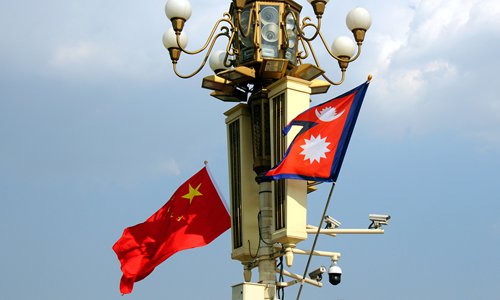Nepalese object to US-led initiative aimed at China
By Hu Yuwei Source:Globaltimes.cn Published: 2020/2/28 7:21:41

Photo: VCG
Nepalese associations and representatives have called for the dismissal of a US-led initiative waiting for approval by the Nepalese parliament, as it is thought to be a key component of the US Indo-Pacific strategy. The strategic plan outlines military efforts aimed at countering China, a country that has long been a friendly neighbor to Nepal.
The initiative would force Nepal to get involved in the competition between China and the US, analysts said, noting that Nepal would not cater to US political strategy at the expense of its friendship with China and be lured with a "financial grant" that has strings attached to Nepal's geopolitical position.
A joint letter sent to the Global Times shows that many Nepalese organizations, party members and individuals condemned and protested against the initiative named "Millennium Challenge Corporation (MCC)" recently, calling it a US "strategic plan to disturb Nepal's national interest, sovereignty, integrity and independence" and appealing "to unite to kick it out" from Nepal.
MCC agreement courted controversy in Nepal as politicians debated over its association with the US Indo-Pacific Strategy and provisions that say the agreement will prevail over Nepal's laws should conflicts arise.
The agreement is ready for the Nepalese parliament, who will vote whether to ratify it.
The MCC Board in the US announced a $500 million grant to Nepal in August 2017 to improve Nepal's energy and road infrastructure, local media reported.
However, many believe that the agreement is aimed at countervailing China's Belt and Road Initiative (BRI), which Nepal signed up for in 2016.
"MCC has already registered in the parliament but to pass from the parliament is nearly impossible due to protest of the ruling party's senior leaders and widespread protesting all over the country from the public level and hundreds of small parties," Prem Sagar, president of Kathmandu-based Nepal-China Mutual Co-operation Society, told the Global Times on Thursday.
Although the MCC describes itself as an "independent US foreign assistance agency that is helping lead the fight against global poverty," many saw its clear intention after senior American officials were repeatedly saying that the MCC is a part of the IPS.
David J Ranz, assistant secretary for South Asia at the US State Department, claimed the MCC was a crucial part of IPS while visiting Nepal last year, Kathmandu Post reported.
Nepal once underlined it firmly adheres to the non-alignment policy, and disapproves of the so-called "Indo Pacific Strategy," and opposes any attempt to stop the development of China, according to a statement issued by the Foreign Ministry of China on Foreign Minister Wang Yi's three-day visit to Nepal in September 2019.
"Being a developing country we can have more foreign aids as well as direct investment but our national interest should be on topmost priority before taking any decision," Kishor Shrestha, chairman of Press Council of Nepal and secretary of general-world association of press councils, told the Global Times on Thursday.
Although the US Embassy in Kathmandu clarified the MCC does not have military components, Nepalese citizens and politicians see through its militaristic agenda and ambitions.
US Defense Secretary James Mattis used the "Indo-Pacific strategy" in his remarks at the Shangri-La Dialogue in August 2018. It points out the US plans to build a stronger geopolitical military alliance than an economic one throughout the region.
The US included in its Indo-Pacific Strategy report that China is a revisionist power and a threat.
Expanding military bases, increasing military presence, and joint military drills are long-term US traditional measures in maintaining stability within the Asia-Pacific region, analysts suggested.
"Security and diplomacy are their inner motives, while development is for display. We cannot accept diplomacy and so-called development linked to the security force strategy of the United States at any cost and terms," said Nepalese in the joint letter sent to the Global Times.
"We have strong experience in destructive behavior by Western power nations on our present benefits and the possibility of a sustainable future," the letter said.
"The US and Nepal don't have much economic ties. The US' effort is directed at China, given Nepal's significant geographical position bordering China's Tibet Autonomous Region," Long Xingchun, director of the Center for Indian Studies at China West Normal University, told the Global Times.
"However, China's favors on Nepal's development and construction is evident and recognized by the Nepalese, which has prompted them not to deconstruct friendship with China for US political purposes. They were very clear that undermine China's interests would eventually hurt themselves," Long said.
Posted in: DIPLOMACY,CENTRAL & SOUTH ASIA